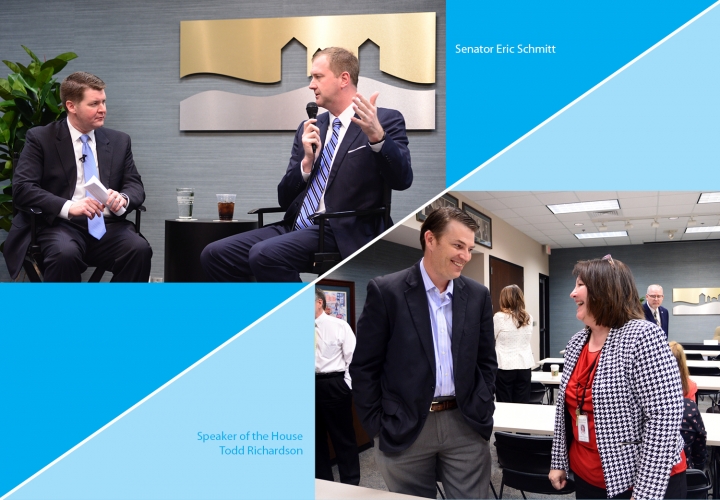Connecting members with decision makers

An important aspect of the Chamber’s mission is facilitating connections—between business owners but also between members and decision makers at local, state and national levels
March was a good month for making connections, as two state legislators visited the Springfield Chamber offices to offer their views of state-level progress and listen to the needs of Chamber members.
On March 4, Sen. Eric Schmitt (R – St. Louis) kicked off the Chamber's inaugural Public Policy Speaker Series, sponsored by Lathrop & Gage. Chamber President Matt Morrow moderated the discussion with the senator about several Chamber priorities including economic and workforce development, transportation funding, ethics reform and education.
Schmitt, chairman of the Senate Economic Development Committee, highlighted the state’s “burgeoning entrepreneurial culture,” but he noted the need for a more streamlined approach to workforce development with the Department of Economic Development, to better compete with other states for entrepreneurial startups and established businesses.
He addressed several issues of importance to Chamber members:
- Transportation infrastructure funding – “We act as an economic superhighway that is capable of getting goods to market quicker," Schmitt said, noting that Missouri has the seventh-largest transportation system in the U.S. He stressed keeping transportation a priority to ensure business is not adversely affected. (Read more about how the Chamber has been pushing for progress on state transportation issues.)
- Higher education – Schmitt sponsored SB 1088, which would allow Missouri higher education institutions to establish advanced degree programs without oversight from the University of Missouri, a bill that would benefit Missouri State University and its ability to offer advanced degrees.
- Ethics reform – Schmitt favors cooling-off periods before legislators can become lobbyists, as well as limits on gifts to legislators.
Following Schmitt’s visit was a March 23 meeting of the Chamber’s Governmental Relations Committee with State Speaker of the House Todd Richardson (R – Poplar Bluff). Speaker Richardson provided Chamber members with an update of what the House has accomplished in the first half of the legislative session: including sending paycheck protection legislation to the Governor and sending multiple ethics reform bills to the Senate.
He then turned to the most pressing need for the remainder of the session: the budget. Richardson said the proposed $27 billion budget includes increases in funding for both K-12 and higher education statewide including increases for Missouri State University and Ozarks Technical Community College. (For more about progress on Chamber priorities, check out our legislative recap.)
Richardson also laid out his vision for how he hopes the House can operate going forward. “We’re very good at dealing with crises,” he said of his fellow legislators. “(But) my focus as Speaker is getting the House to tackle the big problems. We need to be more proactive in addressing those issues.”
He shared ideas in several areas:
- Workforce development – Richardson said he consistently hears about the need for certainty and increased funding for workforce development programs. Missouri currently funds workforce development at lower levels than certain other states with smaller populations.
- Higher education – Richardson noted the value and importance of the state’s two-year colleges, especially in workforce development. He also stressed the need for a statewide agreement allowing for easier transfer of credits from two-year colleges to four-year institutions.
- K-12 funding – He supports revisions to the state funding formula that would make it more feasible to fully fund the formula each year. “It’s easy to put a formula in place if you’re not the ones that have to find a way to fund it,” he noted.
- Transportation funding – While MoDOT’s situation has improved, a long-term solution is still needed … especially when figuring out how to fund interstate improvements. He said a sales tax is off the table, since it failed in 2014, but other options such as gas taxes and excise taxes are still possible.
Richardson praised southwest Missouri as a bright spot statewide. “This area continues to grow at a rapid pace,” he said, “and it’s a testament to the people here and your focus on finding economic solutions.”

